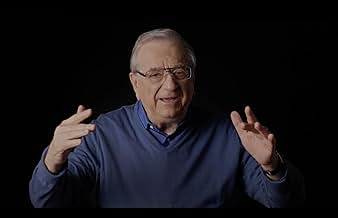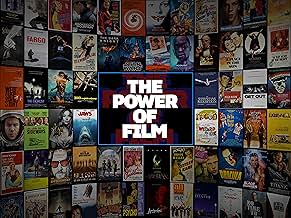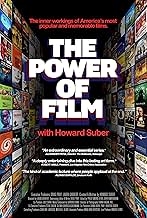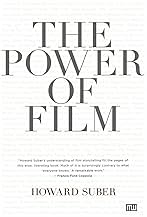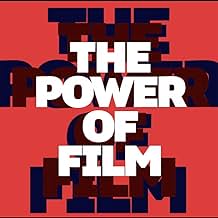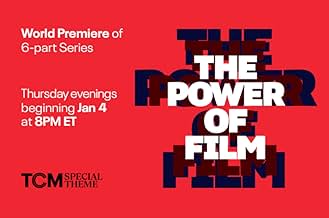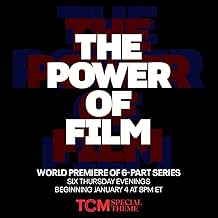Taucht tief in die Kunst des Geschichtenerzählens ein, indem es die entscheidenden Prinzipien und das Innenleben der beliebtesten und denkwürdigsten amerikanischen Filme aller Zeiten untersu... Alles lesenTaucht tief in die Kunst des Geschichtenerzählens ein, indem es die entscheidenden Prinzipien und das Innenleben der beliebtesten und denkwürdigsten amerikanischen Filme aller Zeiten untersucht.Taucht tief in die Kunst des Geschichtenerzählens ein, indem es die entscheidenden Prinzipien und das Innenleben der beliebtesten und denkwürdigsten amerikanischen Filme aller Zeiten untersucht.
- Hauptbesetzung
Folgen durchsuchen
Empfohlene Bewertungen
I am finding this documentary to be very powerful and enjoyably enlightening. Howard Suber has taught film classes at UCLA for 50 years, and he offers insights into writing, directing, characterization, fate and destiny, heroes and villains.
There are numerous clips from all kinds of movies as Professor Suber himself talks directly to the camera about whatever the subject may be. I was a TCF (telecommunications and film) major myself while in college in the mid-1970s, and I had some excellent professors, but listening to this man actually makes me want to take a class from him even today.
This is a superb documentary on TCM and hosted by Dave Karger, who is able to speak to director of the series, Laura Gabbert, and to writer, Doug Pray, both of whom had Suber as a professor in college. Simply well done all around.
There are numerous clips from all kinds of movies as Professor Suber himself talks directly to the camera about whatever the subject may be. I was a TCF (telecommunications and film) major myself while in college in the mid-1970s, and I had some excellent professors, but listening to this man actually makes me want to take a class from him even today.
This is a superb documentary on TCM and hosted by Dave Karger, who is able to speak to director of the series, Laura Gabbert, and to writer, Doug Pray, both of whom had Suber as a professor in college. Simply well done all around.
A collection of movie clips overlaid by narration which is shallow, says pretty much nothing of value and often contradicts itself. The professor will name a "pattern" (usually the vaguest possible theme like "family") and then proceed to illustrate it with examples of movies, hilariously including some, which do not actually feature the stated "pattern" at all.
You are better off watching amateur film montages on youtube, at least they focus on the movies themselves and do not add pretentious, yet meaningless voiceover.
The attempted analysis is very superficial and sometimes almost sounds like a parody. Like this gem of deep thinking: "It was a fatal accident, so it must have something to do with fate". Definitely a fine example of "those who cannot do, teach".
You are better off watching amateur film montages on youtube, at least they focus on the movies themselves and do not add pretentious, yet meaningless voiceover.
The attempted analysis is very superficial and sometimes almost sounds like a parody. Like this gem of deep thinking: "It was a fatal accident, so it must have something to do with fate". Definitely a fine example of "those who cannot do, teach".
This series offers some interesting things to think about but, it seems the professor's train of thought is all over the place. The same few films from more recent years are used from episode to episode, over and over as examples of what his point is. There are so many other films from the classic era that could have been used instead of so many repeat of contemporary films.
I does contain some interesting insights as to what might create a successful screenplay.
The video image of some of the clips at times has a strobing effect that was a bit off-putting.
I so wanted to love this series but it leaves me a bit flat.
I feel it was a missed opportunity to mine the wealth of film material from the past.
I've seen 5 of the 6 episodes so far.
I does contain some interesting insights as to what might create a successful screenplay.
The video image of some of the clips at times has a strobing effect that was a bit off-putting.
I so wanted to love this series but it leaves me a bit flat.
I feel it was a missed opportunity to mine the wealth of film material from the past.
I've seen 5 of the 6 episodes so far.
I'm adding a review to counter a review from 2/1/24. I won't say that this reviewer's thoughts aren't valid. I just wanted to clarify an issue that may have been overlooked, so others have a clear understanding of what to expect.
In the first episode of the series (as he does in the forward of the book with the same title) Suber states that he is only commenting on a select group of popular and memorable movies, since these are movies that most people have probably seen and remember. They act as exemplars. The goal here isn't to provide insight to a wide range of movies; it is to discuss why we respond to movies so that we can apply those insights to the movies we personally remember best.
Having said that this is a series of lectures, with the professor talking into a interrotron camera rig and with select movie scenes used as illustration. I can see how that might not be entertaining for a lot of people and even though I really liked this, I did zone out from time to time.
Personally, I don't think this is really a series about movies. This is a series about audiences. I think a more apt title might have been The Power of Audiences, but who would watch that:)
In the first episode of the series (as he does in the forward of the book with the same title) Suber states that he is only commenting on a select group of popular and memorable movies, since these are movies that most people have probably seen and remember. They act as exemplars. The goal here isn't to provide insight to a wide range of movies; it is to discuss why we respond to movies so that we can apply those insights to the movies we personally remember best.
Having said that this is a series of lectures, with the professor talking into a interrotron camera rig and with select movie scenes used as illustration. I can see how that might not be entertaining for a lot of people and even though I really liked this, I did zone out from time to time.
Personally, I don't think this is really a series about movies. This is a series about audiences. I think a more apt title might have been The Power of Audiences, but who would watch that:)
Mind-numbingly boring and shallow, Professor Blabbermouth takes us into the world of film with nothing new to say while stating the incredibly obvious. If we only had to rely on what this guy says, I doubt anyone other than his immediate family would make it through this (I dropped out after one episode). There are a million film clips that prop up this bore, but they aren't enough to add up to entertainment. The first episode is completely all over the place and makes not much of a point, and the point made isn't much and hardly warranted forty minutes to tell. He should just write down his point on a 3X5 index card and let viewers watch a real movie.
Top-Auswahl
Melde dich zum Bewerten an und greife auf die Watchlist für personalisierte Empfehlungen zu.
Details
- Farbe
Zu dieser Seite beitragen
Bearbeitung vorschlagen oder fehlenden Inhalt hinzufügen

